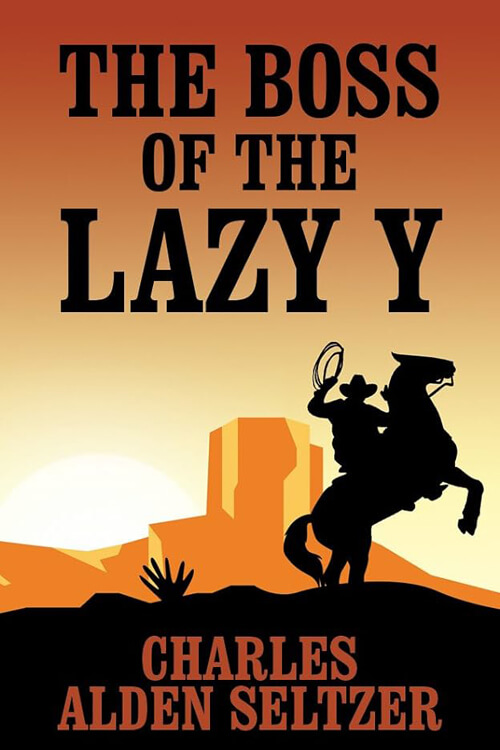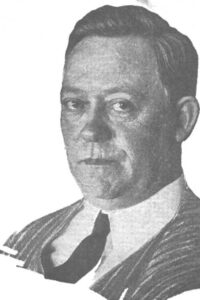
The Boss of the Lazy Y
Shuffling down the long slope, its tired legs moving automatically, the drooping pony swerved a little and then came to a halt, trembling with fright. Startled out of his unpleasant ruminations, his lips tensing over his teeth in a savage snarl, Calumet Marston swayed uncertainly in the saddle, caught himself, crouched, and swung a heavy pistol to a menacing poise.
For an instant he hesitated, searching the immediate vicinity with rapid, intolerant glances. When his gaze finally focused on the object that had frightened his pony, he showed no surprise. Many times during the past two days had this incident occurred, and at no time had Calumet allowed the pony to follow its inclination to bolt or swerve from the trail. He held it steady now, pulling with a vicious hand on the reins.
Ten feet in front of the pony and squarely in the center of the trail a gigantic diamond-back rattler swayed and warned, its venomous, lidless eyes gleaming with hate. Calumet’s snarl deepened, he dug a spur into the pony’s left flank and pulled sharply on the left rein. The pony lunged, swerved, and presented its right shoulder to the swaying reptile, its flesh quivering from excitement. Then the heavy revolver in Calumet’s hand roared spitefully, there was a sudden threshing in the dust of the trail, and the huge rattler shuddered into a sinuous, twisting heap. For an instant Calumet watched it, and then, seeing that the wound he had inflicted was not mortal, he urged the pony forward and, leaning over a little, sent two more bullets into the body of the snake, severing its head from its body.
“Man’s size,” declared Calumet, his snarl relaxing. He sat erect and spoke to the pony:
“Get along, you damned fool! Scared of a side-winder!”
Relieved, deflating its lungs with a tremulous heave, and unmindful of Calumet’s scorn, the pony gingerly returned to the trail. In thirty seconds it had resumed its drooping shuffle, and Calumet had returned to his unpleasant ruminations.
A mile up in the shimmering white of the desert sky an eagle swam on a slow wing, shaping his winding course toward the timber clump that fringed a river. Besides the eagle, the pony, and Calumet, no living thing stirred in the desert or above it. In the shade of a rock, perhaps, lurked a lizard, in the filmy mesquite that drooped and curled in the stifling heat slid a rattler, in the shelter of the sagebrush the sage hen might have nestled her eggs in the hot sand. But these were fixtures. Calumet, his pony, and the eagle were not. The eagle was Mexican; it had swung its mile-wide circles many times to reach the point above the timber clump; it was migratory and alert with the hunger lust.
Calumet watched it with eyes that glowed bitterly and balefully. Half an hour later, when he reached the river and the pony clattered down the rocky slope, plunged its head deeply into the stream, and drank with eager, silent draughts, Calumet swung himself crossways in the saddle, fumbled for a moment at his slicker, and drew out a battered tin cup. Leaning over, he filled the cup with water, tilted his head back, and drank. The blur in the white sky caught his gaze and held it. His eyes mocked, his lips snarled.
“You damned greaser sneak!” he said. “Followed me fifty miles!” A flash of race hatred glinted in his eyes. “I wouldn’t let no damned greaser eagle get me, anyway!”
Read or download Book
Charles Alden Seltzer
Charles Alden Seltzer (August 15, 1875 – February 9, 1942) was an American writer. He was a prolific author of Western novels, had writing credits for more than a dozen film titles, and authored numerous stories published in magazines, most prominently in Argosy.
Life
Seltzer was born in Janesville, Wisconsin, the son of Lucien B. Seltzer and Oceania Hart of Columbus, Ohio. Before becoming a successful writer, he was variously a newsboy, telegraph messenger, painter, carpenter, manager of the circulation of a newspaper, building inspector, editor of a small newspaper, and an appraiser.
He married Ella Seltzer, and they had three sons and two daughters. His son, Louis B. Seltzer, later editor of the Cleveland Press, recalled that the family was quite poor when his father was struggling to break into the writing profession (he wrote two hundred stories before receiving an acceptance). During this time, Seltzer’s wife brought him wrapping paper from the butcher to write on.
In addition to Argosy, Seltzer’s work also appeared in Adventure, Short Stories, Blue Book, The Outing Magazine, Western Story Magazine, and the US edition of Pearson’s Magazine.
Seltzer wrote his westerns from the experience of five years living in New Mexico. Towards the end of his life, he was also elected mayor of North Olmsted, Ohio, a Cleveland suburb, from 1930 to 1935.
Works
- The Council of Three (1900) – first book
- The Range Riders (1911)
- The Two-Gun Man (1911)
- The Triangle Cupid (1912)
- The Coming of the Law (1912)
- The Boss of the Lazy Y (1915)
- The Range Boss (1916)
- The Vengeance of Jefferson Gawne (1917)
- “Firebrand” Trevison (1918)
- The Ranchman (1919)
- The Trail to Yesterday (1919)
- The Trail Horde (1920)
- Beau Rand (1921)
- “Drag” Harlan (1921)
- West! (1922)
- The Way of the Buffalo (1924)
- Last Hope Ranch (1925)
- Trailing Back (1925)
- Channing Comes Through (1925)
- “Slow” Burgess (1926)
- Land of the Free (1927)
- The Mesa (1928)
- Mystery Range (1928)
- Brass Commandments (1928)
- The Valley of the Stars (1928)
- The Gentleman from Virginia (1928)
- The Red Brand (1929)
- The Raider (1929)
- Gone North (1930)
- A Son of Arizona (1931)
- Double Cross Ranch (1932)
- War On Wishbone Range (1932)
- Lonesome Ranch (1933)
- Clear the Trail (1933)
- West of Apache Pass (1934)
- Silver Spurs (1935)
- Kingdom in the Cactus (1936)
- Parade of the Empty Boots (1937)
- Treasure Ranch (1940)
- Arizona Jim (1942)
- So Long, Sucker (1943)






